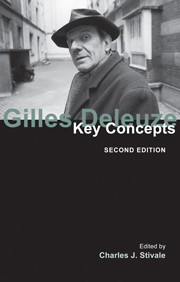Introduction: Gilles Deleuze, a life in friendship
Summary
In L'Abécédaire de Gilles Deleuze (Deleuze's ABC Primer), the eight-hour video interview with Claire Parnet filmed in 1988–89 and transmitted only in 1995, French philosopher Gilles Deleuze describes his idiosyncratic understanding of the links between friendship, creation and life. Responding to a question from Parnet (in the section “F as in Fidelity”), Deleuze hypothesizes that in order to form the basis for friendship with someone, each of us is apt to seize on a certain indication of an individual's charm, for example, in a gesture, a touch, an expression of modesty or a thought (even before that thought has become meaningful). In other words, friendship can result from perception of the charm that individuals emit and through which we sense that another suits us, might offer us something, might open and awaken us. And a person actually reveals his or her charm through a kind of démence or madness, Deleuze says, a certain kind of becoming-unhinged, and as the very source of a person's charm, this point of madness provides the impulse for friendship.
I commence with this angle of approach because, with me, the authors here offer contributions precisely in this spirit, seeking to extend the folds of friendship through which Deleuze lived, wrote, and taught. Such glimmers of light and encounters with Deleuze's writing engage readers in an exhilarating, productive, yet disconcerting process of becoming-unhinged that we come to enjoy, indeed to relish, in the energy that reading Deleuze requires.
- Type
- Chapter
- Information
- Gilles DeleuzeKey Concepts, pp. 1 - 18Publisher: Acumen PublishingPrint publication year: 2011



